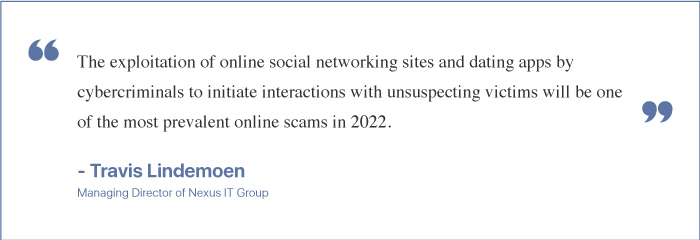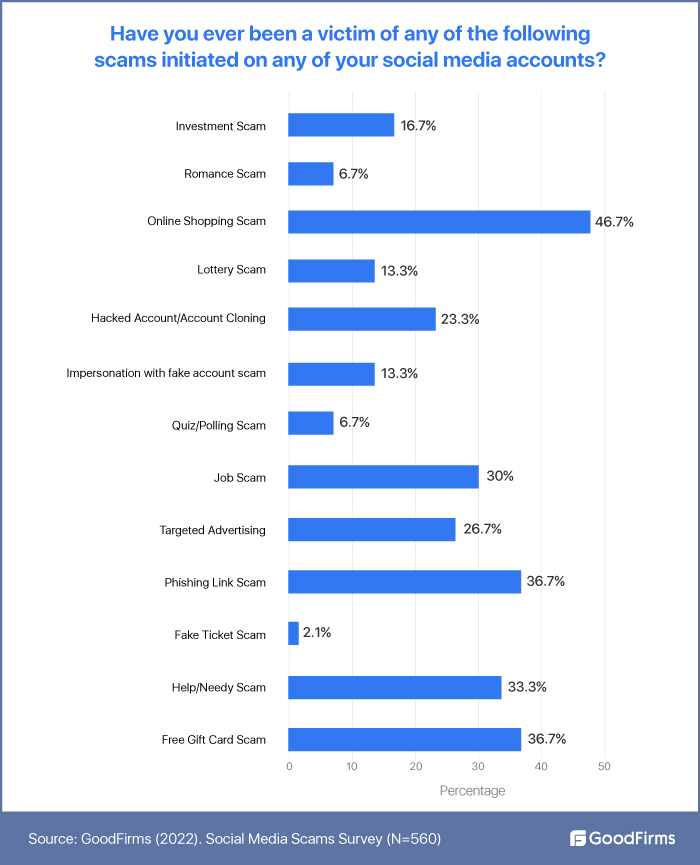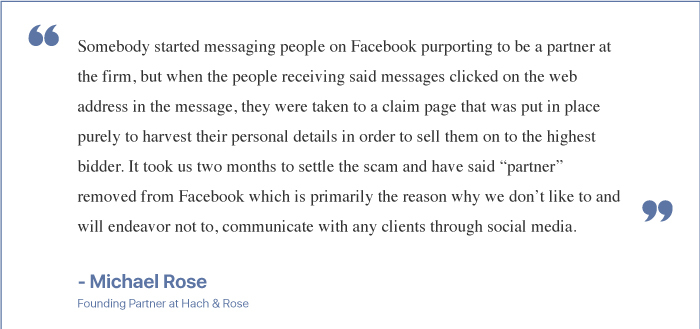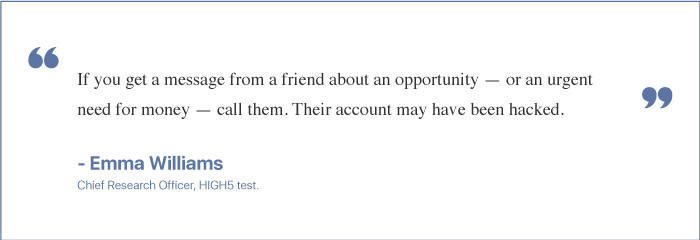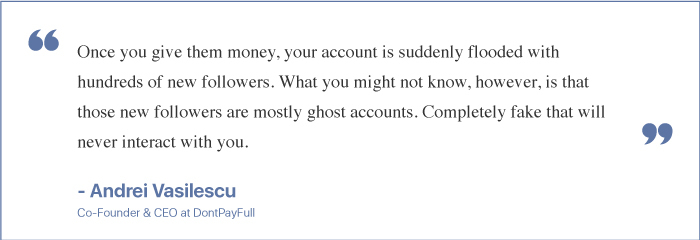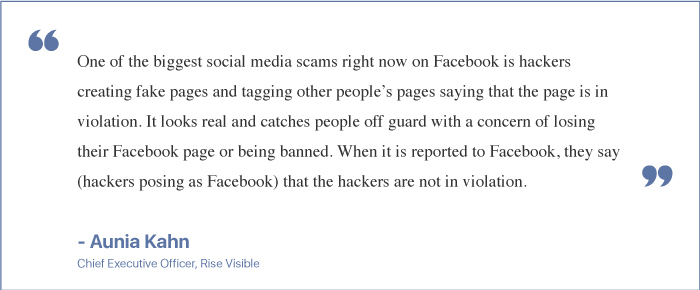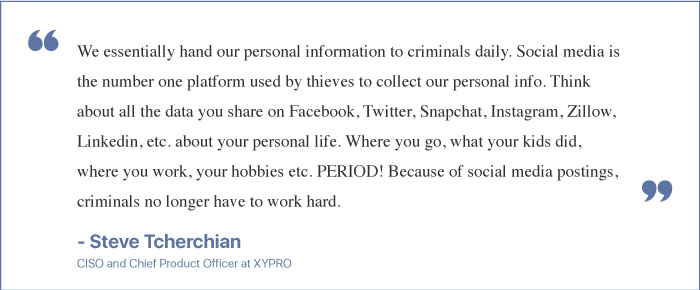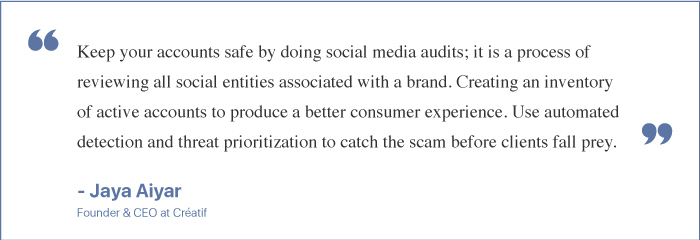ABSTRACT:
Social media scams are seeing a sharp uptick these days. The intensity and reach of social media scams have magnified enormously, especially after the pandemic. With the rise of technology, scammers have evolved their devious tactics. From imitating recognized brands, and well-known celebrities to duping on the pretext of dating or providing free gift cards, the deceptive methods of scammers have seen an upward trajectory only. The enticement has caused many users to lose their money; some have even lost their life savings.
This research titled: 'Social Media Scams - Stunning Statistics and Tips to Protect Yourself' identifies and analyzes the prevalent social media scams. The research also explores a few factors practiced currently to prevent falling prey to scams. The survey further uncovers ways to protect oneself from unscrupulous social media scammers. Goodfirms carried out an online survey between 1st June 2022 and 8th June 2022. A total of 560 responses were collected. The survey queried selected social media users across the world on their encounters with scammers, victimization by social media scams, social media usage habits, and related perceptions.
The survey aims to educate individuals and businesses on better protecting their social media accounts and developing a keen sense that can detect and avoid scams before they materialize.
Table of Contents:
Introduction
The Current State of Social Media Scams
Scammers Exploit the Inherent Human Traits
Major Variants of Social Media Scams:
- #Investment Scams
- #Romantic Lure: (Damsel in Distress)
- #Online Shopping Scams
- #Lottery Scams
- #Cloning/Hacking Scams
- #Impersonation Scams
- #Free Gift Card Scam
- #Job Scam
- #Phishing Link Scam
- #Quiz and Polling Scam
- #Help/Needy Scam
- #Targeted Advertising
- #Fake Ticket Scams
Fake News Scams Capitalize on Irresistible Click Baits
Influencer Scams are on the Rise
Other Noteworthy Scams
- Inheritance Scams are Rampant
- Tax-Related Scams are on the Rise
- Ghost Brokers
- Covid Post-Vaccine Survey Frauds
Have Social Media Giants Failed to Protect Users from Scams?
Reporting Scams to Authorities is Critical to Stay Safe on Social Media
Factors that Prevent People from Falling Prey to Social Media Scams:
- Cognitive Ability
- Prudence
- Duration on Social Media Platforms
- Knowledge of Security and Privacy Features
- Social Media Usage Habits
Tips to Protect Yourself From Social Media Scams
Key Findings
Conclusion
References:
Introduction
Social media scams pose a global challenge to businesses, consumers, governments, and even platform providers. While government regulations and platform-driven scrutiny are in place to protect all stakeholders from social media scams, the increasing number of scams reveals the inadequacy of such measures. Hiding behind the anonymity of bogus accounts and fake profiles, the scammers ruthlessly defraud their unsuspecting targets. Moreover, the scam world has become more structured, highly organized, and targeted. With the adoption of automated tools, high-end technologies, and new-age cyberattack mechanisms, scammers have developed digital competencies, and are now more equipped to attack specific and larger groups.
A few standard practices of scammers to dupe people of their money or extract personal data include; impersonation, fake ads, false job offerings, honey traps, phishing, etc. Social media scams can have devastating consequences on the financial, emotional, and physical well-being of people.
The survey 'Social Media Scams - Stunning Statistics and Tips to Protect Yourself’ aims to deliver reliable statistics related to social media scams experienced by users. The research also identifies and analyzes various types of prevalent scams on social media. The research further outlines the best ways by which individuals can protect themselves from social media scams.
The Current State of Social Media Scams
Social media has turned into a breeding ground for internet scams.
The world is witnessing a proliferation of scam attempts on social media with highly sophisticated techniques. Risks for social media users, including vulnerability to scams, have increased due to automated attacks that can target huge volumes of social media accounts. While social media giants such as Facebook, Twitter, Instagram, etc. have ratcheted up their security measures and sanctions, the malicious scam attempts have also intensified equally.
The Federal Trade Commission (FTC), USA, which works to prevent consumer scams, reported that in 2021 alone, social media scams had cost $770 million to 95K people. This translates into an increase of 18 times from what people lost five years ago in 2017. Also, the number of people who reported losing money on social media went up by 19 times (from 5K in 2017 to 95K in 2022).(1)
Crypto Scams are Increasing on Social Media Platforms:
The losses have widened in 2022. In quarter one of 2022, people lost $329 million to ‘cryptocurrency frauds’ alone that were initiated on social media.(2) Illegal scams have caused many to lose their hard-earned money.
26.7% of Goodfirms’ surveyees faced a scam but did not lose money, and 21% of Goodfirms’ surveyees reported losing money due to social media scams.
Most reported romance scams, phishing links, job scams, donating to fake charity sites, and online shopping scams as the main culprits behind loss of money. Some brought fake and low-quality products endorsed by manipulative Influencers who exploited their large followings.
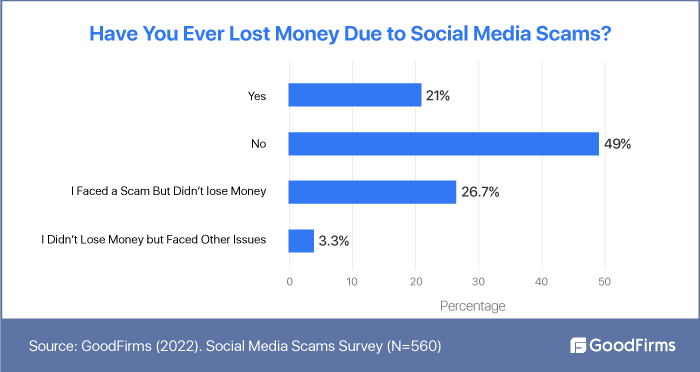
Social media is a wonderful place to get information, meet new people, and share ideas. It’s also home to countless scams, hoaxes, and schemes that can cost users their money. In the past year, we’ve seen an increase in lame Instagram marketing campaigns, fake giveaways, and pages that promise free new products.
There are many reasons why people might get scammed on social media.
- First, there are simply more people using it than ever before.
- Second, social media is often viewed as an extension of real-life and so people feel that they can connect with strangers more easily.
- Third, technology has made it easier than ever for scammers to create fake profiles and spread misleading information.
There are three main types of techniques that scammers use to execute scams: social engineering, phishing, and hacking.
- Social engineering involves tricking someone into revealing information or performing a task that they would otherwise not do.
- Phishing refers to sending URLs in text messages or emails in an attempt to steal user information or cause damage to the device itself.
- Hacking is when someone takes control of another person’s account or device by either accessing their login information or installing malware on their device.
Unfortunately, there are plenty of people who fall for these schemes time after time. Scammers mostly take advantage of poor authentication measures and the naivety of users to unleash their goals. However, most scam games are psychological in nature.
Scammers Exploit the Inherent Human Traits
Victimization on social media platforms is a result of psychological compulsions and attitudes that form human behavior.
The theory of persuasion by Robert B. Cialdini, the Regents' Professor Emeritus of Psychology at Arizona State University, is a plausible explanation of why people fall into the traps. The need and an inherent desire for reciprocation route people into conversation with scammers. The reciprocation desire stems from a sense of obligation to complete the exchange of information. Once the individuals are emotionally vested in the conversation, there is an inner urge to continue the behavior.
And lastly, the belief that persistent efforts bring results escalates the commitments on social media. The 'affective commitments' result in people parting with their valuables, money, gold, etc., at the request of scammers whom they barely know. (3)
Each scam is an exploitation of a particular trait in human behavior. For example, a sense of patriotism will pressure an individual to spare money for the kids of deceased soldiers. Therefore, scammers posing as charity organizations helping soldiers' kids will generally engineer attacks targeted toward those who share patriotic images, posts, and videos on social media.
Another instance of human psychology exploitation is romance scams. When scammers posing as beautiful and distressed women offer to marry the lonely ones, the temptations are hard to resist. The inner sense of romanticism precedes the enticement. The scammers create a chain of proofs to validate the statements made by them. External factors and pieces of evidence such as transaction receipts, email proofs, bills, tickets, etc. (all fake but presented as legitimate) strengthen the affection drive, and the victim evades any meaningful stream of consciousness that might propel them towards doubts and suspicions. Thus falling into the vicious trap.
Many of the scammers are part of organized crime groups. For instance, the notorious Scarlet Widow, an organization of cybercriminals based in Nigeria, has been continuously involved in social media scams and has also evolved its tactics over time to execute more sophisticated scams.(4)
Scammers allure people looking for relationships and love with fake profiles of good-looking and attractive personas. Such profiles target lonely people, divorcees, and the elderly. Another popular scam type deployed by Nigeria-based scammers is the 419 scam which targets people in western countries. The name originates from section 419 of the Nigerian criminal code, which outlaws fraud.(5)
Goodfirms’ research has identified the major social media scam types and their penetration among social media users.
Major Variants of Social Media Scams:
#Investment Scams
16.7% of respondents reported being a victim of investment scams that commenced on their social media accounts
Investment scams start with pitches that make unrealistic promises and often use social media direct messaging services to target people who are already vulnerable. These are ‘become rich quickly’ type schemes. Some of the most common investment scams include Ponzi schemes, which are designed to look like legitimate investment opportunities.
Online investment scams tend to target new investors who are looking for quick high returns. Investment scams also target people looking for a way to boost their savings or retirement savings. The scams usually involve promises of big payouts or guaranteed returns. Once the victim deposits the money, the crooks disappear and all their social media accounts either get deleted or become unreachable.
#Romantic Lure: (Damsel in Distress)
6.7% of respondents surveyed by Goodfirms reported being a victim of an online romance scam initiated on their social media accounts.
Romance scams target people who are looking for love and affection. The perpetrators create fake profiles on popular social media sites, like Facebook and Instagram, in order to lure unsuspecting individuals into a relationship. Once they’re in, the scammers ask the victim to send money or gifts as a way to ‘prove’ their love.
For instance, the victim is contacted by a scammer posing as a wealthy woman on social media. The message says that the woman's guardians have died, and she is left with huge money. She further explains that she wishes to send the money out of her country for security reasons, and she is looking for a trustworthy person for the same. The woman also claims that she is looking to marry outside her country and settle with a caring man. She cites reasons such as a threat to life due to enmity, war, or an ill-natured husband for her decision to move outside the country. Mostly, lonely and divorced men are easy targets for this type of scam. This scam is executed by asking for fees for transferring funds from one bank to another, and the victim is convinced that the fees need to be paid in the currency of the destination country.
The con artists leverage social engineering techniques to exploit human psychology. Beginning by nurturing emotional bonds with the victims, the scammers end their larceny after plundering substantial amounts of money from their victims.
A common theme across these scams is the interweaving of religion and romance. Most of the scammers present themselves as ‘God-fearing’ and ‘utterly religious’ people. Showing themselves religious serves two purposes, it projects scammers to be genuine, and second, it builds a quick connection with religion-inclined people.
Goodfirms tried to survey on how many were victimized categorically based on the type of social media scams. The below stats reveal the percentage of surveyees who were victimized by various types of scams that were initiated on their social media accounts.
#Online Shopping Scams
46.7% have been a victim of online shopping scams on social media
Online shopping scams take advantage of the recent uptick in the popularity of social commerce by offering the chance to buy products at discounted prices. Scammers reach out to social media users posing to be legitimate businesses with online stores. These fake online stores actually do not sell their merchandise but defraud people by taking money but not delivering the products.
The meteoric rise of social commerce and increased consumer confidence in online buying venues indirectly help fraudsters perpetrate online shopping scams. The prevalence of a plethora of fraudulent websites and tactics makes it difficult for consumers to differentiate between authentic and illegitimate sales.
#Lottery Scams
13.3% have purchased a fake lottery ticket via social media that never materialized
The basic idea behind a lottery scam is to convince people to buy a fake lottery ticket and claim a big prize. The scammer then collects the money from a pool of people who buy fake lotteries and runs away, leaving the buyers with nothing.
Scammers create fake lottery tickets that look identical to reputed lottery schemes and are designed to fool consumers into believing they've won a big prize. Scam artists will tag these tickets with codes or barcodes to make it seem as though they’re legitimate.
#Cloning/Hacking Scams
23.3% have experienced cloning or hacking attempts on their social media accounts
Account cloning refers to the replica of an existing, legitimate social media account by a scammer. Scammers create an identical social media account using the name, profile picture, and personal details of the victim.
With cloned accounts, scammers reach out to the friends, relatives, and other acquaintances of the victim with connection requests. Once the request is accepted, the scammers initiate conversations pretending to be the victim. The idea is to either ask for money or information that can be misused for unscrupulous monetary activities.
Cloned accounts of celebrities for deceiving people are generally made by adding @official or @fanpage to the celebrities’ names.
Hacking scams are different from cloning ones in the sense that they are based on stealing the login credentials of the users to hack the existing accounts. No parallel account is created; the actual account is hacked. Hackers do not even have to send friend requests as they already get access to all sections of the accounts, including friend lists, messages, photos, videos, etc.
#Impersonation Scams
13.3% reported being victims of impersonation where fraudsters created fake accounts in their names
Impersonation frauds that occur on social media involve scammers using social media platforms to impersonate someone else. Social media impersonation is a form of online identity theft in which a fake account or profile is set up to imitate a real person. The person who is impersonated may not even know their account has been compromised until they see an unauthorized post on the account in their name.
However, impersonation of business accounts is a new trend. Michael Rose, the founding partner of Hach and Rose, a law firm based in the USA, reveals how an imposter claiming to be a partner at their firm deceived their clients.
Impersonation fraud is typically used for financial gain and is most often seen in other areas like online dating, online auctions, and job postings on social media.
#Free Gift Card Scam:
36.7% have been offered fake gift cards on social media
Gift card scams are hard to spot because most of them look like real deals. The scammer will offer a gift card for some discounted price. You buy it and then later find out that the card is fake or the discount was only valid for a limited time. Scammers may post a fake gift card offer on Facebook or ask you to send a friend's personal information in order to receive one.
If you receive an unsolicited gift card offer from someone you do not know, do not give out any personal information. If you have received an unsolicited gift card offer that requests your social media login, it is a scam.
#Job Scam
30% respondents reported falling victim to job scams instituted via their social media profile
Amidst the tough job market, and when unemployment is high, scammers target people who are desperate and willing to do whatever it takes to find work. In tough economic times, many people are looking for work. And scammers know this, so they will try to target these people. These scammers may offer fake jobs for a fee or even ask people for money to help them with their job search. They direct candidates to a job that doesn't exist and ask for money as security deposits or application fees.
They may also send out spam emails that look like mass emails from companies hiring. They pose as employers or recruiters and attempt to steal personal information and money, take out loans or get credit cards in the candidate's name.
Work-from-Home Scams are the latest addition to Job Scams
After the pandemic, many job-seekers are looking for WFH jobs. Scammers are utilizing this development to circulate job ads on social media that provide WFH opportunities. These ads are either embedded with phishing links or cheat job-seekers out of their money.
#Phishing Link Scam:
36.7% have experienced a phishing link scam attempt on their social media accounts
A phishing link scam on social media is a type of fraud that involves a scammer enticing their targets to click on suspicious links that steal information or infect the target user’s device with a virus. The link takes the user to an external website or webpage. In most cases, the website will look similar to the real site but with minor cosmetic differences.
Phishing scams are inherently designed to trick users into revealing sensitive information, such as their usernames and password. The goal of phishing link scams is usually to steal your login credentials, either for personal or financial gain. Many phishing scams use keyword-based marketing tactics to increase the likelihood that users will click on a malicious link.
A phishing link scam occurs when someone uses a legitimate-looking email address or website to trick you into revealing your information and unrestricted access to your account
Recently, metaverse investors received links on their social media accounts. Investors were tricked into believing that those links were portals to the metaverse. However, when they clicked, their personal information was compromised.(6)
#Quiz and Polling Scam
6.7% of surveyees have fallen victim to Quiz and Polling Scam on Social Media
The quiz and polling scam involves the creation of fraudulent websites with misleading titles and content designed to look like legitimate polling sites. The scammers create fake polls so that they can collect personal information that can be used to commit identity theft, such as users' names, addresses, email addresses, and phone numbers.
The most common way that this scam works is through social media platforms. The scammers create fake accounts on popular social media sites such as Twitter and Facebook. They then harness these fake accounts to ask users to take part in fake polls or quizzes. Some of these polls are just thinly-veiled marketing campaigns from companies looking to profit from user data.
#Help/Needy Scam
33.3% have received request messages by scammers posing to be their acquaintances to help them monetarily for an emergency
As the Internet continues to grow, scam artists continue to find new ways to lure unsuspecting victims online. Needy scams are the ones in which scammers posing as friends, relatives, employees, seniors, supervisors, etc., message victims on social media to send them money, citing some emergency. Social media accounts are either hacked or duplicated to fool unsuspecting people into believing that their acquaintances are really in some need. However, it is always prudent to call and confirm the requirement before sending any money to these scammers.
Charity Scams are a subset of Help/Needy Scams.
In this version of the scam, the scammers send social media direct messages that read like it is sent from a trustworthy organization and asks for donations for humanitarian relief efforts. The real charity has no connection to this social media profile. The scammers also send certificates for tax exemptions for donating to their organization. The fake Social media donation drives for Australia Bushfire relief are a recent example of charity scams.(7)
#Targeted Advertising
26.7% surveyees reported being lured away by Targeted Advertising
One common way scammers or unscrupulous business owners try to lure people into buying something is through targeted advertising. A targeted ad is a type of digital ad that is specific to an individual or a group of people.
This type of ad can be delivered through social media. It uses data from the target audience to display relevant ads that are likely to resonate with them. Using Google Ads and personalized advertising features, scammers can trick users into clicking on ads that are designed to sell fake or low-quality products.
Another way scammers try to trick people through social media ads is to steal personal information. These ads look like real advertisements, but they're actually fake ads that are designed to get people to click on them and give away their personal information so the scammer can steal their money.
#Fake Ticket Scams
2.1% surveyees reported falling victim to fake ticket scams
Ticket scams are specific problems in the world of sports and entertainment, with fraudsters posing as ticket sellers to sell fake tickets. Scammers may offer tickets for sale at a discounted price or even sell them online. They'll ask buyers to pay using a gift card, wire transfer, or other untraceable methods.
Fake News Scams Capitalize on Irresistible Click Baits
46.7% of surveyees have been a victim of a fake news scam on social media (believed or reposted it).
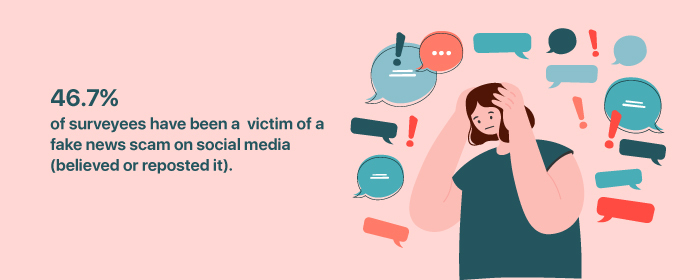
Fake news scams capitalize on human inquisitiveness. They take advantage of people’s willingness to share and engage with content. A fake news story comes with a compelling headline that appears to come from a credible source. They are written in an attractive style and have all the right buzzwords. Any story shared without proper verification could fall into this category. These include sensational headlines that play on the innate desire to be entertained, rumors passed around via social media, and clickbait articles designed to elicit a reaction from readers.
People are also very interested in the personal lives of celebrities. The result is that any fake news about celebrities proliferates online. "Scams like these succeed because they capitalize on people's inherent curiosity and intrigue with celebrity news", says David Wurst, Founder WebCitz. These scams are often disseminated and spread through social media posts with enticing headlines and viral images that encourage more clicks and shares. It's a form of misleading information that's designed to be viral.
There are two types of fake news: Intentional and Unintentional.
Intentional fake news is written and disseminated with the intention of deceiving people. Unintentional fake news refers to false stories that are circulated without anyone's intent to deceive. These may be stories that have been published by websites that have been hacked or by bots that automatically publish content using stolen identities.
Fake news can cause real problems. It can cause people to act irresponsibly, which can hurt other people and lead to dangerous outcomes.(8) Many of the fake stories are used for political gain, economic gains, creating unrest, deceiving people, manipulating share prices, sabotaging competitor brands, etc.
There are mechanisms in place to remove fake news related to the functioning of political processes, eliminate misinformation that can cause physical harm, rumors that can cause riots, etc. Social media platform authorities also have digital tools that can detect and slow down the spread of viral misinformation and hoaxes.
However, most social media giants fail to enforce policies related to fake news or misinformation. "A policy that simply prohibits "misinformation" would not provide useful notice to the people who use our services and would be unenforceable, as we don't have perfect access to information", says Facebook.(9)
Influencer Scams are on the Rise
53.3% of surveyees have come across a social media influencer with a massive following but promoting scam offerings/Fake Products/Risky Financial services.
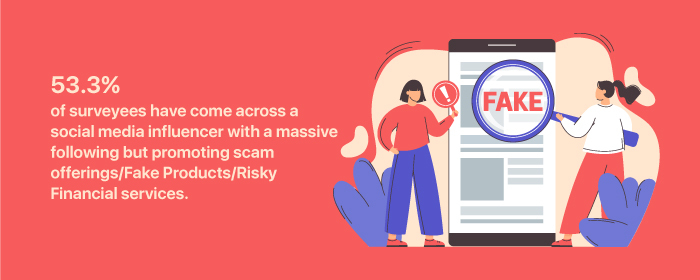
Hiding their true nature behind glamorous lifestyle displays, manipulated likes and comments by fake followers, etc., the self-styled hawkish influencers persuade innocent users to buy fake products and useless services. These influencers ask their followers to use the custom URLs provided by them to buy products to get price discounts. These URLs may not belong to genuine product sites, and the user may be deceived into buying a fake product or a copy of the original product.
Not only do fake influencers scam people, but genuine influencers are scammed themselves too.
How scammers con influencers:
#Ambassador version: Scammers posing as brands contact micro-influencers via social media and offer affiliate marketing opportunities or a chance to become brand ambassadors for their brands.
The imposters then ask for registration fees and close the conversation once the registration fees are received.
#Follower Scam: One more version of an influencer scam is that fake marketers contact budding influencers and Instagram creators and offer to increase their followers. They give unrealistic and very lucrative figures at very low prices. Many fall into this trap and pay money to increase their following. However, in most cases, no followers are added, and influencers lose their money to the now unreachable scammer. In some cases, the influencers might see a huge rise in their following, but they are mostly from ghost accounts.
#Copyrights Violation Scam: Scammers also dupe influencers on Instagram and rising YouTubers by falsely implicating copyright violations on the part of the latter ones. The YouTubers and Instagram artists are compelled to pay huge sums to retain their channels or accounts.
Other Noteworthy Scams
Inheritance Scams are Rampant
Social media messages that promise vast riches in the form of inheritance are rampant. The scammer pretends to be a lawyer of a wealthy foreigner who died without leaving an heir. So, the lawyer is looking for someone with the same surname as the deceased to inherit the property. The scammer asks for half of the wealth after the legal transition of the property to the victim's name. In reality, there is no inheritance property, and the idea of the scammer is to extort money in the name of legal fees to be paid in advance by the victim.
“The scammer poses as a legal advisor of the dead person and claims that a large fund is trapped due to unclaimed status, and asks for a fraction of the money for arranging the inheritance proceedings. The scammer then demands money for registration, legal proceedings, and taxes to be paid in advance for the intrusion-free transfer of the property.”(10)
Many fall into this trap and send money in order to inherit the property. In this con, the scammers posing as inheriting huge wealth and high-value items like gold or money ask the victim to send money (as a part of legal fees) in order to obtain the items. While this is happening, the scammers stay in contact with their victims by using social media, email, or phone calls. Once the victim sends the money, the scammers disappear.
Tax-Related scams
Tax-related scams are fraudulent schemes that claim to be able to get you a refund for bogus tax deductions. You may receive a link or message on your social media account from an individual claiming to be from the IRS or from someone you know. These scam artists may tell you that you owe money, or that they know about a tax fraud scheme and can help get your money back. They may ask for your bank account information, debit card PIN numbers, social security number, credit card details, or other personal information. Scammers will often offer fake refunds as “rewards” for sharing personal information or for downloading an app.
Scammers may pose as someone from the IRS, or someone offering to help with tax preparation. They may even post things such as “IRS refund check in the mail”. This can mislead taxpayers who are expecting to receive a tax refund.
Ghost Brokers
Scam car insurance ‘ghost brokers’ costing victims £1,950 (11)
Ghost broking is a type of insurance fraud that involves someone pretending to be a licensed insurance agent and selling policies to unsuspecting consumers. Ghost broking is often used in conjunction with other types of fraud, such as identity theft and false claims, which can make it more difficult for law enforcement to detect. Ghost brokers may offer insurance products through a website, or social media posts embedded with links to their fraudulent website. Ghost brokers often claim that they can help you obtain insurance without filing any paperwork or paying any fees, but these claims are also likely to be untrue.
Covid Post-Vaccine Survey Fraud
The post-vaccine survey scams are the latest addition to scammers' vicious fraud techniques. The Department of Justice, USA had issued a warning pertaining to post-vaccine scams.(12) In these scams, fraudsters contact victims on social media accounts and claim that the consumers who fill out the survey forms will be rewarded with gifts and prizes. Later, those who have filled out the forms receive congratulatory messages for winning the same. However, the scam works by asking the victims to either provide their personal details and banking information to receive the money or pay for shipping costs to receive the gifts. Those who pay shipping costs never receive gifts or prizes and those who share personal information are at risk of getting defrauded financially.
Have Social Media Giants Failed to Protect Users from Scams?
63.3% of surveyees think that media companies have failed to protect users against scams.
Facebook, Twitter, Instagram, etc. have policies in place to prevent fraudulent activities, and they remove posts, comments, and image content that tries to deceive people or misrepresent facts with a motive to defraud or exploit others. Any scam attempt on the platform or activity that can cause financial loss to members is prohibited on the platforms.
Despite all these efforts, many scams initiate, flourish and go unchecked on social media platforms.
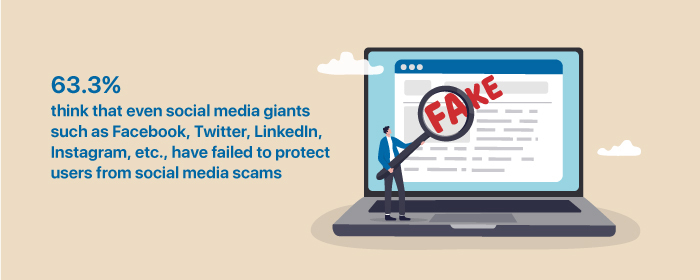
One plausible explanation for this weakness in platforms' ability to detect and prevent fraud is that most scams are carried off via Direct Messages(DMs) that are not monitored by platforms. However, in such cases, social media networks cannot be blamed, as monitoring DMs is a violation of users' privacy rights.
Direct Messages are gaining traction among scammers as there is less chance of scrutiny and reporting by aware social media users. Goodfirms surveyed social media users about direct messages they received on their social media accounts.
The below image details the top 10 scam messages received by respondents:
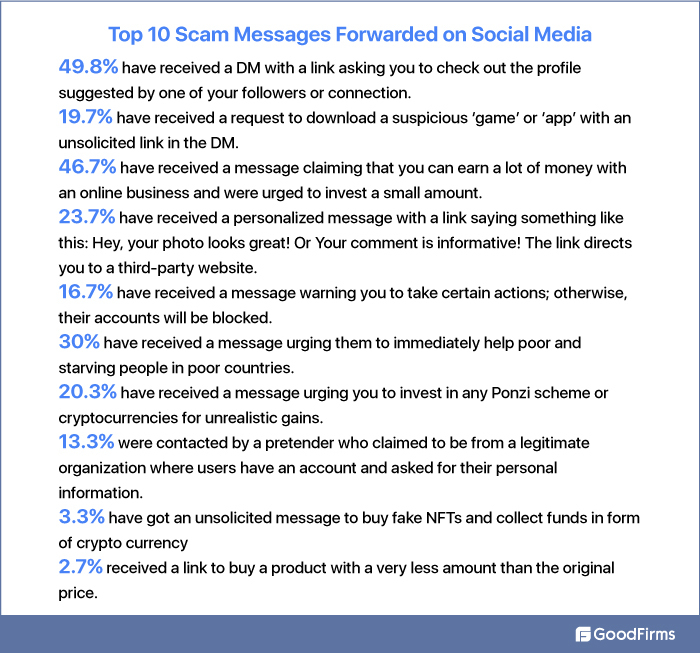
Believing any of the above messages costs users their money or the loss of personal information. Goodfirms' survey found that 26.7% will quit the platform rather than opt for security measures in case they fall into the trap of any of the social media scams. Quitting the platform can be an impulsive decision arising from fear of further scams or anger directed towards the platform's inability to protect users.
Rather than blaming social media platforms, aware users should opt for security measures that help curtail the scams. To protect other users and reduce liability, one must report the scam and opt for security measures rather than quit the platform.
Reporting Scams to Authorities is Critical to Stay Safe on Social Media
Social media is one of the most exciting yet potentially dangerous places to be. If you are new to the platform and do not know how to protect yourself from scammers and phishers, the best way to stay safe is by reporting scams to authorities as soon as possible. By doing this, you can help authorities step in and prevent you and other people from falling victim to the scam. By taking this step, you can help protect yourself from becoming a victim and help keep your information secure.
65.8% surveyees have reported a social media account or a fishy post as a scam. However, 28.9% respondents expressed an inability to report scams as they are unaware of the process.
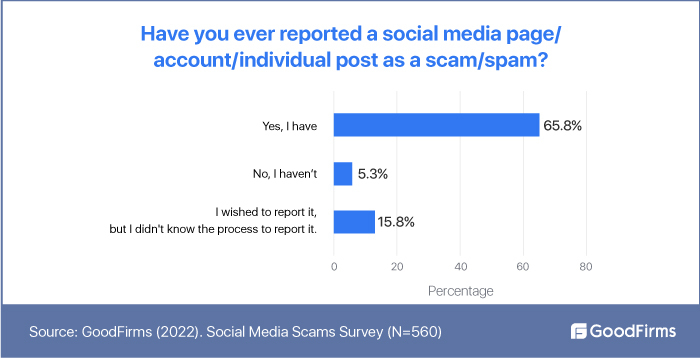
- When you receive any suspicious messages, you should report them immediately. You can do this by contacting your local law enforcement agency or by using the social media platform’s built-in reporting tools.
- Check your bank accounts regularly and keep an eye out for suspicious transactions.
- If you suspect that your credentials and identity have been stolen, it's important to get in touch with the police authorities so that they can take action against the perpetrator.
- When you see direct messages on social media that seem suspicious, block the account and report the post to the social media platform’s team. By reporting the message, you help the team track down who is behind it and prevent it from spreading further.
- You can also call your local police department if you have any doubts about the post’s legitimacy. They can assist you in filing a report with social media websites and help to identify the scammer.
Factors that Prevent People from Falling Prey to Social Media Scams:
Cognitive Ability
Strong cognitive abilities act as a bulwark against the gullibility of scams. Cognitive impairment lowers social judgment skills and may increase susceptibility to scams, especially in older people.(13) People with better cognitive faculties may not impulsively follow a scammer’s instructions and think more rationally about the adverse consequences. Cognitive abilities make people stay vigilant, and such users can spot things like fake profiles, misleading advertisements, suspicious links, and red flags like requests for sensitive information or requests for money.
Prudence
Prudence may help people stay inviolable on social media. Prudence in the form of cautiousness and discretion may provide the necessary foresight that may see what is coming. The chain of events that leads to the execution of social media scams can be stopped if people exercise extreme caution and avoid any reckless interaction on social media.
46.7% of surveyees state that they can differentiate between authentic interaction and scammers on social media channels.
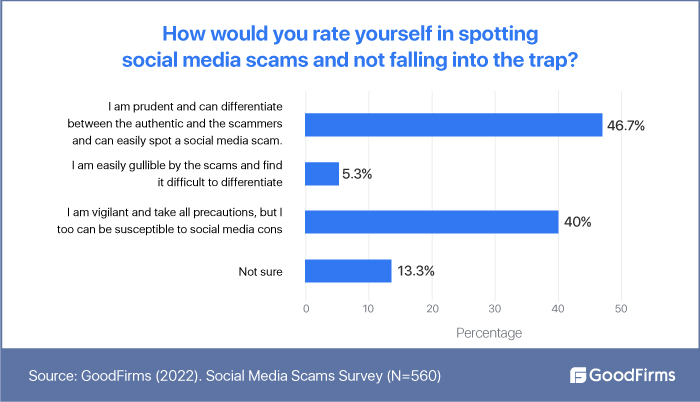
The prudent ones are aware of what sites they are visiting, are extra cautious with email links received on social media, use strong passwords, do not trust anyone who asks for personal information, and never pay anything over social media. These respondents also use security software like Anti-Virus and Anti-Malware, know how to report suspicious activity, and always look for second opinions before making any decisions.
Duration on Social Media Platforms
People who have been on social media for a longer period of time know more about the prevalent scams and are better positioned to detect any suspicious activity. These people have already come across many posts that expose scams and stories by users about how they were scammed. This makes them more knowledgeable, and if similar attempts are targeted towards them, they are more likely to detect them.(14) Users who have already spent considerable time on social media platforms enjoy a vantage point and are more likely to cease engagement with the scammer before getting deceived.
Knowledge of Security and Privacy Features
All major social media platforms, such as Facebook, LinkedIn, Instagram, etc., have robust security measures and privacy features in place to protect the participants. These security features are updated regularly, and those who follow everything as advised by the platform are less susceptible to scams.
For example, Facebook's transparency page prohibits users from posting content that falls into the category of investment scams, loan scams, Ponzi schemes, gambling, charity scams, Illuminati scams, fake jobs scams, coupons scams, and many more.(15)
These posts are removed by Facebook, and the account is flagged. Facebook also has an enforcement team comprising Engineers, data scientists, and review teams that work proactively to detect scam content and remove it.
Social Media Usage Habits
Social media usage habits are critical determinants of how one is leveled up against scammers. Susceptibility to scams also depends on knowledge of information technology and awareness of best usage practices. People who share very personal events on their timeline, live feeds with exact locations, and snaps of buying costly items such as luxury cars, high-end bikes, premium watches, etc., can easily come under the radar of scammers.
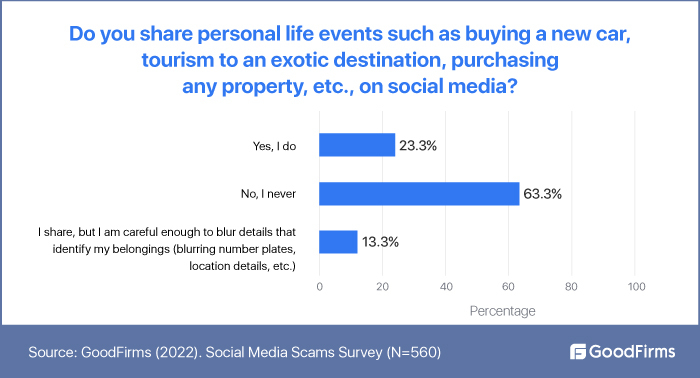
Goodfirms’ survey revealed that 23.3% of users do not hesitate to share their personal life events on social media. 63.3% never share such details on social media, and 13.3% do share but with caution. 13.3% blur the exploitable details before sharing personal events on social media platforms.
Tips to Protect Yourself From Social Media Scams
Social media is an essential tool for businesses to connect with customers and build brand loyalty. However, it’s also a convenient place for scammers to prey on unsuspecting consumers. However, with caution, vigilance, and prudence, one can detect scam attempts and stop them from happening.
Red flags that can help to spot romance scams:
- Be wary of people who ask for money in exchange for a romantic relationship.
- If you receive unsolicited intimate photos from scammers and in return, you are asked to do the same.
- The scammer doesn’t interact via a legitimate phone number or avoids video calls
- You are told that an expensive gift has been sent to you but it will require you to pay for custom clearances or postal charges
To protect yourself from lottery scams
- Before signing up for an online lottery, be sure to do your research before entering. Many online lotteries use social media as a way to announce new jackpots, but they do not actually run the lottery. Instead, they will ask the winner to pay a fee before the check is sent. This can be a rip-off.
- Be wary of people who try to lure you into buying lottery tickets with social proof (friends talking about winning) or offers that seem too good to be true. (five tickets for the price of one).
To avoid investment scams:
- Be cautious when coming across financial offers online. If in doubt, check with a professional advisor before investing.
- Never send money or share sensitive information with someone you do not know well.
- Look out for red flags, such as inflated investment returns, unrealistic selling deadlines, and unrealistic closing dates.
- Always do your research and make sure that an investment opportunity is legitimate before you put any money into it.
- Watch out for signs of fraud, such as exaggerated claims or unrealistic guarantees of large returns.
To detect job scams:
- Research the employer before you go through the application process.
- Check out the company's website and make sure the contact information matches what is listed in the ad.
- Ask around to see if others have had previous experience working with the organization or have heard of negative reviews online.
- If possible, meet in person with someone who works at the company before you commit to anything.
- Be wary of promises of high pay or unrealistic working hours.
- If you're asked to pay an upfront fee in order to be considered for a job, then it can be a scam. Mostly, scammers pose as placement agencies and demand registration fees. Do not pay unless you actually get the job and pay only from the salary received.
To spot online shopping scams
- Study Seller’s website for security protocols such as https://, Secure sockets Layer (SSL) (16)
- There are warning signs to spot a fake product seller. Seller’s reputation and reviews: negative reviews or comments about a seller could be an indication. Also, be vigilant about fake positive reviews.
- Be wary of overly aggressive sales tactics.
- Do not buy things from random websites you found online.
- Do not click on shipping notifications unless it is from the legitimate seller's website.
- Do not fall for freebies that do not make sense.
- Before you decide to buy based on a social media ad or post, check out the profile of the company. Also, type its name in a search engine with words like 'scam' or 'complaint.'(17)
To uncover fake news
- Educate yourself about how misinformation spreads online and how you can stay informed about current events in your community.
- The best way to avoid falling prey to fake news is not to share any links that you do not trust.
- It’s also important to be skeptical of headlines and graphics. You should only trust sources that you know and trust, like reputable news organizations or research websites.
- Do not forward or post any fact without cross-checking from a legitimate source.
- A lack of provenance in the source of information, such as bad grammar or spelling mistakes, is an indication that the news is fake.
Safeguarding against phishing link scams
- Be wary of social media DMs that offer free coupons or discounts for groceries, clothing, or services. These may be scams structured to steal your login credentials and money.
- To stay safe online, be aware of common signs of phishing attacks and other types of cybercrime. These include social engineering tactics, such as fake websites and emails; strange links, popups, and banners; and unexpected behavior from your peers or employees.
- Always check the URL before entering your credentials anywhere. If it looks like it could be legitimate, do not give anyone access to your account.
- Never input your email address and password to open locked PDFs or for gaining access to online resources
To avoid being taken in Quiz and Polls scams:
- Look at the URL to see how it was created
- Review the terms and conditions
- Always make sure you are dealing with a reputable company before entering any personal information.
- Never submit any personal information even if you believe there is an opportunity to win a grand prize.
- Be careful when entering any contest or giveaway.
Avoiding fake ticket scams
- Be sure only to buy tickets from official websites or authorized sellers.
- Do not send money to anyone who contacts you out of the blue asking for money to buy a ticket.
Avoiding being a victim of cryptocurrency scam:
- If you're interested in investing in cryptocurrencies, make sure that you do your homework first and only invest with reputable companies and choose a verified online exchange for storing your cryptocurrencies
- Never attempt to buy cryptocurrencies from website links received from random social media messages
- Do not believe in claims of unrealistic investment returns in crypto investments.
- Never share your crypto wallet’s private key with anyone, even with the one claiming to be the manager of your crypto wallet company
Regularly Conduct Social Media Audits
Businesses and Influencers Should Regularly Conduct Social Media Audits:
One way to protect against social media fraud is to conduct social media audits regularly. A social media audit is a process of reviewing your company's social accounts and taking steps to improve them. This includes monitoring your company's presence on social media networks, as well as reviewing posts and comments from customers. By performing social media audits regularly, you can quickly identify any potential problems or red flags and take action before the issues augment.
Look for posts that seem too good to be true, unusual clicks and engagement levels that do not make sense, and other red flags if you notice anything suspicious, flag the post or account so others can see it as well.
It’s also important to keep an eye out for fake profiles and accounts. Many fraudsters create fake social media accounts to share misleading content or solicit personal information from unsuspecting users. If you see a suspicious account that seems out of place, report it to Facebook or Twitter to prevent future harm.
Use social media monitoring tools to regularly conduct social media audits to detect and prevent potential scams before they become a problem.
Key Findings
- Social media has become the center stage of internet-based scams.
- 21% reported losing money to scams that were initiated on their social media accounts.
- Social engineering, hacking, and phishing are the top three techniques scammers use to dupe social media users.
- 46.7% have been a victim of online shopping scams on social media
- 16.7% of respondents reported being a victim of investment scams that commenced on their social media accounts
- 6.7% of respondents surveyed by Goodfirms reported being a victim of an online romance scam initiated on their social media accounts.
- 23.3% have experienced cloning or hacking attempts on their social media accounts
- 13.3% have purchased a fake lottery ticket via social media that never materialized
- 36.7% have been offered fake gift cards on social media
- 30% of respondents reported falling victim to job scams instituted via their social media profile
- 36.7% have experienced a phishing link scam attempt on their social media accounts
- 33.3% have received request messages by scammers posing to be their acquaintances to help them monetarily for an emergency
- 26.7% surveyees reported being lured away by Targeted Advertising
- 46.7% of surveyees have been a victim of a fake news scam on social media (believed or reposted it).
- 53.3% of surveyees have come across a social media influencer with a massive following but promoting scam offerings/Fake Products/Risky Financial services.
- Cognitive abilities, prudence, duration on social media platforms, knowledge of security measures, and usage habits prevent social media users from falling prey to scams.
- 63.3% of surveyees think that media companies have failed to protect users against scams.
- 26.7% will quit the platform rather than opt for security measures in case they fall into the trap of any of the social media scams.
- 28.9% respondents expressed an inability to report scams as they are unaware of the process.
- 46.7% surveyees claimed that they could differentiate between the authentic and the scammers on social media channels.
- One way to protect against social media fraud is to conduct social media audits regularly.
Conclusion
Social media has become an indispensable tool for businesses of all sizes, but it's also a ripe target for fraudsters looking to steal customers' information or cash. Scammers are now shifting towards sophisticated attacks that target NFT buyers, Metaverse investors, crypto users, etc. Fake NFTs and fake portals selling cryptocurrencies are on the rise. Financial difficulties caused due to the pandemic are also a reason behind increased scams.
There is an increased usage of social media platforms for engagement, marketing, and customer service purposes. The proliferation of social media accounts within workplaces has also opened doors for substantial scam risks. Businesses and individuals can combat scams and stay in the safe territory by following the best social media usage practices and tips suggested in this research. One can also deploy social media management software with fraud detection features to efficiently manage social media accounts and protect their followers too.
We sincerely thank our Research Partners who participated in the Goodfirms Social Media Scam Survey 2022.
References:
- https://www.ftc.gov/news-events/data-visualizations/data-spotlight/2022/01/social-media-gold-mine-scammers-2021
- https://www.ftc.gov/news-events/data-visualizations/data-spotlight/2022/06/reports-show-scammers-cashing-crypto-craze
- https://www.researchgate.net/publication/291148518_Principles_of_Persuasion_in_Social_Engineering_and_Their_Use_in_Phishing
- https://www.agari.com/cyber-intelligence-research/whitepapers/scarlet-widow-romance-scams.pdf
- https://www.britannica.com/topic/Nigerian-scam
- https://www.cnbc.com/2022/05/26/cybercriminals-target-metaverse-investors-with-phishing-scams.html
- https://theconversation.com/beware-of-bushfire-scams-how-fraudsters-take-advantage-of-those-in-need-129549
- https://www.sciencedirect.com/science/article/pii/S1364661321000516
- https://transparency.fb.com/en-gb/policies/community-standards/misinformation
- https://www.scamwatch.gov.au/types-of-scams/unexpected-money/inheritance-scams
- https://sg.news.yahoo.com/scam-car-insurance-ghost-brokers-social-media-230142879.html
- https://www.justice.gov/opa/pr/justice-department-warns-about-fake-post-vaccine-survey-scams
- https://www.frontiersin.org/articles/10.3389/fpsyt.2021.685451/full
- https://ncvc.dspacedirect.org/handle/20.500.11990/1858
- https://transparency.fb.com/en-gb/policies/community-standards/fraud-deception/
- https://www.forbes.com/advisor/personal-finance/online-shopping-scams/
- https://www.itascabank.com/docs/default-source/fraud-scam-alerts/scams-that-start-on-social-media.pdf
unidev.com
disruptivedigital.co
brandum.nl
openxcellinc.com
nexusitgroup.com
unionlawfirm.com
high5test.com
webcitz.com
advantisglobal.com
dontpayfull.com
risevisible.com
xypro.com
creatif.com
thestockdork.com
barbend.com
joyorganics.com
bettertools.io
nexusitgroup.com
thepestinformer.com
supercanbullysticks.com
revenuegeeks.com
buyersguide.org
dyl.com
workello.com
norsemenco.com
cerealsecrets.com
fresha.com
bullseyelocations.com
cicinia.com
imgkits.co
mortgage-relief.com
everwallpaper.co.uk
boxoutmarketing.com
owlratings.com
notta.ai/en/home
airgram.io
neutypechic.com
romantific.com
niawigs.com
hernorm.com
athletedesk.com
askapril.com
yoyipet.com
iupilon.com
twiz.io
parachorconsulting.com
kennedysworld.com
spylix.com
legiit.com
poised.com
